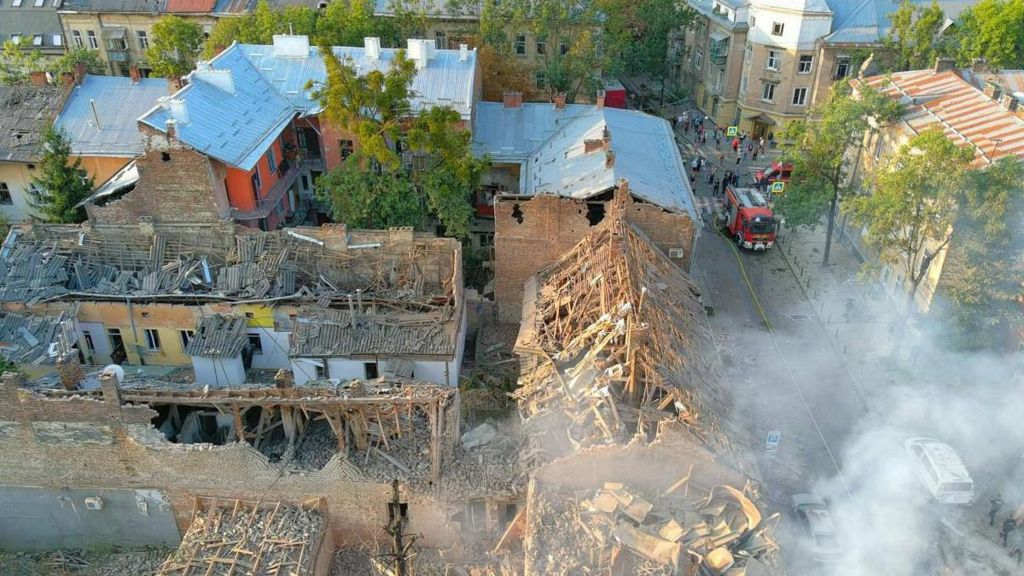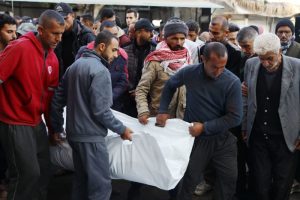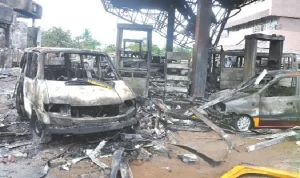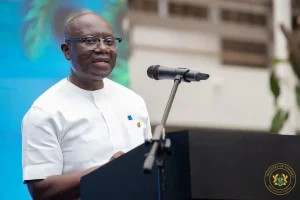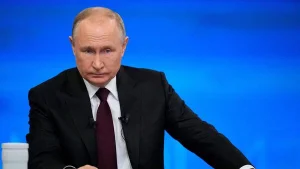A mother and her three daughters were among seven people killed in Ukraine’s western city of Lviv, during a fresh wave of Russian attacks. A baby and another girl were also killed, officials said.
Lviv Mayor Andriy Sadovy said Russia had attacked with drones and hypersonic missiles early on Wednesday.
The attack came as Ukraine reeled from Russia’s deadliest single bombardment this year – a strike on a military institute in the central city of Poltava that left 53 people dead.
Explosions were also heard on Wednesday over the capital Kyiv as air defences targeted Russian missiles. Five people were wounded in Kryvyy Rih when a hotel was hit and nearby blocks of flats were damaged.
The attack on Lviv in the far west of Ukraine came as all of Ukraine was under air raid alert. Witnesses said the city was targeted at about 05:40 (02:40 GMT).
Russia’s defence ministry said it had fired Kinzhal hypersonic weapons at Ukrainian defence industry facilities in Lviv and that all designated targets had been hit.
However, Mr Sadovy said Russia’s attack had damaged more than 50 buildings in the historic heart of Lviv, including homes, schools and clinics.
He posted a picture on social media of a local family, saying that only the father had survived. His wife, Yevgenia, and their three daughters – Darina, Emilia and 21-year-old Yaryna – all died in their own home, he said.
The Ukrainian air force said Russia had fired 13 missiles and 29 attack drones and that seven cruise missiles and 22 drones were shot down.
Mr Sadovy said some buildings were struck near the railway station and Lviv regional administration head Maksym Kozytskyi said residential buildings had been damaged in the attack.
Lviv has largely been spared the worst of the fighting over the two and a half years of war, but last week, Russian strikes targeted its energy infrastructure causing outages, according to officials.
President Volodymyr Zelensky renewed his calls for Ukraine’s Western allies to all their long-range weapons to be fired further into Russia.
In Poltava, rescue workers continued to search through the rubble of the military communications institute for survivors of the attack.
Mykyta Petrov, a 26-year-old cadet who only started there two weeks ago, said two missiles hit shortly after 09:00 (06:00 GMT) on Tuesday, the second detonating just three seconds after the first.
“I ran outside, there was smoke and dust everywhere…lots of people were outside having a cigarette, and many were killed.”
The cadet said there was “too much blood, too many dead bodies”, and what he had seen had affected him psychologically.
An air raid siren had gone off two minutes earlier, but had not given people enough time to reach bomb shelters.
“You just imagine you’re on the sixth floor of some building and you need to run away downstairs. Is it realistic that you can do this in two minutes?” Ukrainian MP Oleksiy Goncharenko told the BBC.
Officials said 271 people had been wounded in the Russian strikes on Poltava, and by Wednesday afternoon, 400 people had already given blood at the main regional hospital.
Among them was Oleksandr Moskvich, 38, who was badly wounded on the frontline last year in the fierce battle for the eastern city of Bakhmut.
He pointed to scars on his neck and back where he had been shot by Russian troops while he was on patrol. “At the moment I can only give people my blood, my support. I can talk to them and try to understand, because I passed through this.”
Poltava is observing three days of mourning and there was an eerie quiet throughout the hospital. A Ukrainian flag flew outside the building with a black ribbon attached, while inside, the corridors of the blood donation ward were filled as people waited their turn.
The doctor in charge of blood donation, Volodymyr Rudikov, said the people of Poltava had joined together at an unimaginably difficult time: “This is something I’ve never seen in my 16 years as a chief doctor.”
President Zelensky promised that what he called “Russian scum” would pay for the attack, and repeated calls for more air defences so Ukraine could protect itself by carrying out its own long-range missile attacks.
In a statement confirming the deaths of military personnel, Ukraine’s land forces said an investigation was under way to establish whether enough was done to protect those in the facility the missile hit.
Poltava regional governor Philip Pronin called the attack a “cunning and cynical Russian strike,” and later said 15 people were still thought to be trapped under the rubble.
Mr Zelensky was due to meet the Irish premier on Wednesday as Ireland prepared to announce new funding for Ukraine’s war effort.
The Irish government said the package would provide essential humanitarian assistance, support rehabilitation and eventual reconstruction, and contribute to Ukraine’s longer-term goals.
Source:bbc.com

